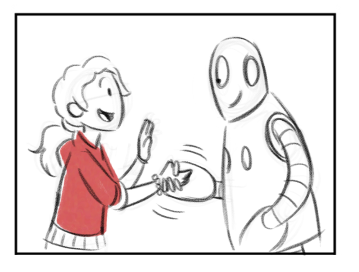
Greetings can offer recognition, affection, respect, and sometimes—a blessing. In Yiddish, if you’re greeted in the morning with גוט־מאָרגן! (gut-morgn!), you might respond by wishing that person גוט־יאָר! (gut-yor!)—a good year. Don’t just have a good morning, you’re saying, have a good year!
There is no simple “hello” in Yiddish; greetings match the time of day, or the day itself. Note that gut-morgn is not restricted to the morning, but used in the afternoon as well. Here are greetings for the evening, for the Sabbath and weekdays, and for holidays; the response to all of them is gut-yor:
*From Saturday evening on at the beginning of the new week
If you meet someone that you haven’t seen in a while, you might say “שלום־עליכם!” (sholem-aleykhem). This phrase comes from Hebrew and literally means “peace be upon you”. It has its own reply, as well:
You may have even heard this phrase before. Solomon Rabinovitsh, a Yiddish writer in the late nineteenth and early twentieth century, chose this classic Yiddish greeting as his pen name, and has been known the world over as “Sholem Aleichem” ever since.
In YiddishPOP you can hear the greeting gut-yontev in the movie of lesson 5.2, and a Yiddish “good-bye”, zay(t) gezunt (literally: be well), in lesson 3.2.
